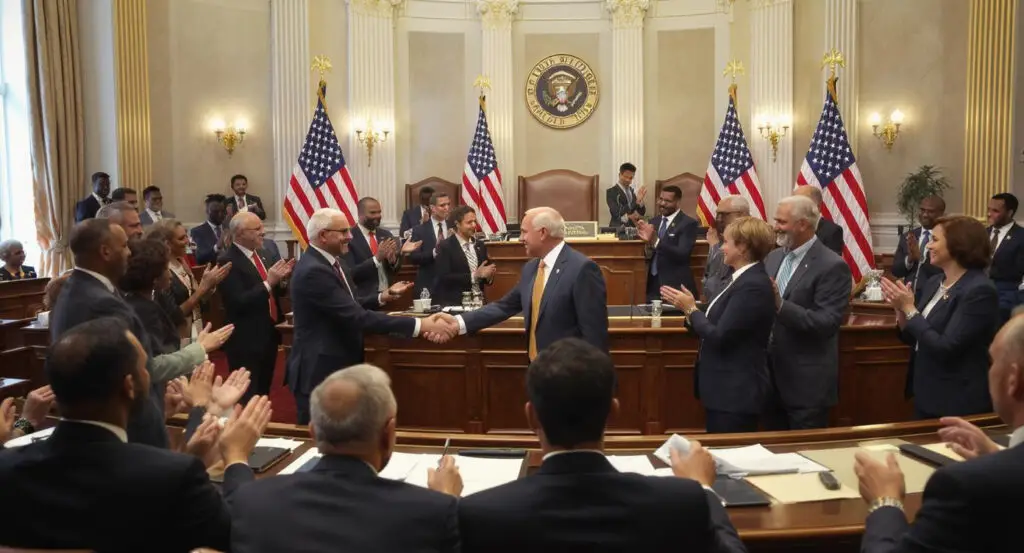The United States has achieved a significant milestone in cryptocurrency regulation with the passage of its first major national legislation, the “Guiding and Establishing National Innovation for US Stablecoins Act of 2025,” commonly known as the GENIUS Act. This bill, which sets up a regulatory regime for stablecoins, has cleared both the House and Senate and is expected to be signed into law by President Donald Trump on Friday.
The GENIUS Act: Regulating Stablecoins
The GENIUS Act focuses specifically on stablecoins, a type of cryptocurrency designed to maintain a stable value by being pegged to traditional assets like the U.S. dollar or government bonds. These tokens are crucial to the crypto ecosystem, acting as a bridge between traditional and blockchain-based financial worlds and facilitating transfers between various cryptocurrencies.
The newly passed legislation mandates that stablecoins must be backed one-for-one with US dollars or other low-risk assets, aiming to enhance stability and consumer confidence in this rapidly growing segment of the crypto market. It also includes provisions for requiring issuers to hold reserves equal in value to their outstanding cryptocurrency and to comply with anti-money laundering (AML) programs and regular audits. A notable provision within the law prohibits members of Congress and their families from profiting off stablecoins, though this exclusion does not extend to the President or his family, a point of contention given President Trump’s increasing business ties to the crypto industry.
Broader Crypto Legislative Push and Trump’s Shifting Stance
The GENIUS Act is one of three key cryptocurrency bills backed by the Trump administration that have advanced through Congress. The House also passed the “Digital Asset Market Clarity Act” (CLARITY Act), which seeks to establish a clearer regulatory framework for other digital assets and delineate oversight between the SEC and CFTC. Additionally, the “Anti-Central Bank Digital Currency Surveillance State Act” was passed by the House, aiming to prevent the Federal Reserve from creating a central bank digital currency (CBDC) due to privacy concerns. While the GENIUS Act is poised for immediate enactment, the other two bills now head to the Senate for further consideration.
President Trump, who once publicly derided crypto as a “scam,” has notably shifted his stance, embracing the industry as he gained political backing and engaged in crypto ventures himself. His administration has already taken steps to support the sector, including an executive order reportedly planned to open the $9 trillion US retirement market to crypto, gold, and private equity investments. His family’s involvement with firms like World Liberty Financial, which launched its own stablecoin, has also drawn attention.
Industry Hopes vs. Critic Concerns
Supporters of the GENIUS Act view it as a crucial step towards providing clear rules for a maturing industry, fostering innovation, and ensuring the U.S. maintains its leadership in payment systems. The crypto industry has heavily lobbied Congress for such measures, hoping to spur broader adoption and mainstream integration of digital currencies.
However, critics argue that the bill, despite its intentions, introduces new risks into the financial system by legitimizing stablecoins without establishing sufficient consumer protections. Concerns include the potential for tech firms to engage in bank-like activities without similar oversight and complex bankruptcy processes in the event of a stablecoin firm’s failure. A coalition of consumer and advocacy groups warned that the bill might allow for the proliferation of assets that consumers mistakenly perceive as safe.
Despite these criticisms, the GENIUS Act garnered significant bipartisan support, with approximately half of Democrats joining the majority of Republicans in its favor, illustrating the growing political influence of the crypto industry. While some analysts, like Terry Haines of Pangaea Policy, suggest that this might be the “end of crypto’s wins for quite a while,” the passage of the GENIUS Act undeniably marks a monumental shift, providing the first major national regulatory framework for digital assets in the United States.























